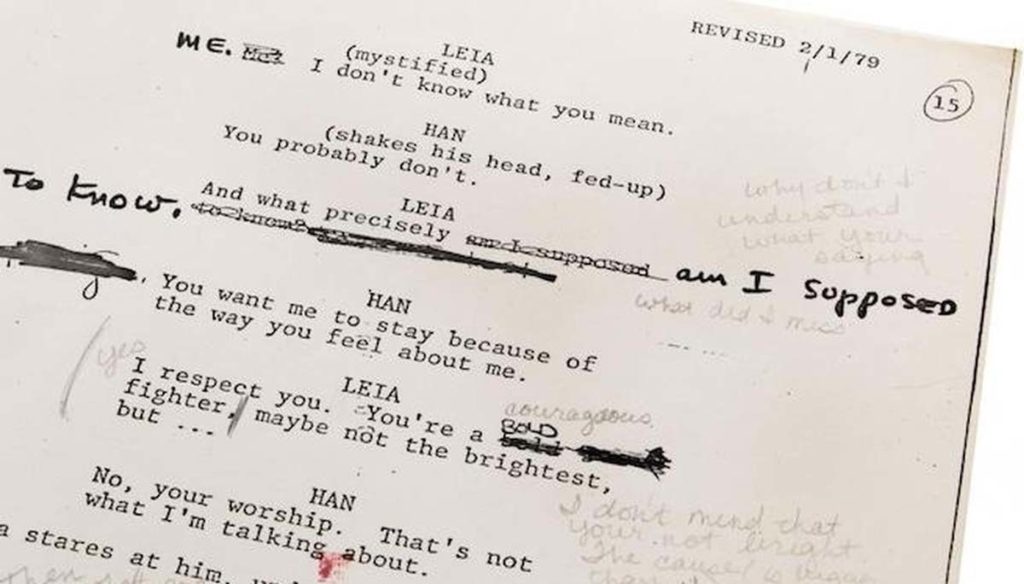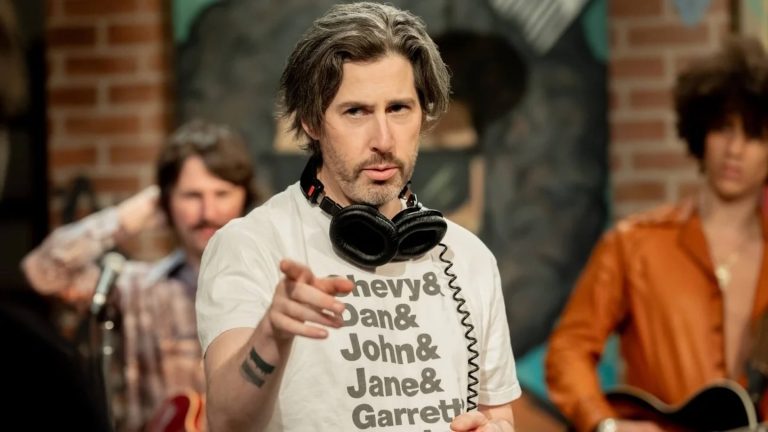10 Rules of Film/TV Industry Etiquette Screenwriters Should Know

What etiquette should screenwriters follow when dealing with Film/TV industry insiders?
The screenwriting journey is wrought with constant rejection. Because of this, screenwriters are desperate. And desperation is a dangerous spell to fall under because you can burn bridges very fast — and the leads you do get may be scared away by that desperation.
With that in mind, we've compiled a simple list of etiquette rules and guidelines that all screenwriters should know and follow to better their chances of creating opportunities and relationships within the Film/TV industry.
Don't Pitch on a Hollywood Insider's Social Media Threads
The last thing you want to do as a screenwriter is burn a bridge by overstepping your social media bounds.
- Don't cyber-stalk Hollywood insiders on social media.
- Don't pitch them projects through Twitter, Instagram, or Facebook threads.
You need to understand that if they were to express interest in anything you pitch on a public thread, that would open the flood gates for thousands of others to try and do the same. So don't even attempt to drop loglines or pitches in threads.
And what many don't understand is that there are legal reasons why they can't and shouldn't. What's to stop a frivolous lawsuit if some or any of the elements you pitch already exist within their current projects? Unsolicited pitches don't attract Hollywood insiders — they scare them away.
And what happens if they do take the time to read them and don't respond the way you'd like them to? They are opening themselves up to public ridicule, trolling, and unnecessary drama.
Don't Ask Successful Screenwriters To Read Your Scripts
Novice screenwriters make the mistake of thinking that working and produced screenwriters will go out of their way to help other screenwriters by reading and forwarding scripts. That's just not how it works.
If you message a screenwriter that has seen some success in their careers and ask that they read your script and help you get representation, you're putting them in complicated situations.
- Just because they've had success doesn't mean they have power within the industry.
- They're still grinding away trying to get their scripts read — let alone having to now try to get your script read.
- It has taken a long time for them to make their contacts. They're not going to want to jeopardize them for somebody else's scripts.
- Let's say your script is amazing. Would you want to trade in your one in a million shot for somebody else? Why should they want to?
- It's a huge commitment to read a script and offer notes. It takes time away from their families and their writing hours. They don't have the time for it.
- As mentioned above, for legal reasons, they can't and shouldn't read your scripts.
You may find one or two mentors willing to check out your work and offer advice. But the hard fact is that most successful screenwriters who want to help others have a stack of screenplays from friends, family members, and peers that they are close to.
Don't ask successful screenwriters to read your scripts — it's a waste of your time.
Don't Ask Successful Screenwriters to Partner with You on a Script
To be honest, it's kind of a shady request. It's very obvious that you're trying to piggyback off of their success. It puts that person in an uncomfortable situation — and it's not a good look for you as well.
Working screenwriters have their own projects that they're trying to sell and produce. They don't need or want anyone else's. Writing partnerships happen through personal and professional relationships — not through direct messages and comments from strangers.
While that may sound harsh, know that most working screenwriters empathize with your situation. But understand that if you are making such requests, hundreds more are doing the same exact thing. Just go write the script yourself and follow your own path.
Don't Send Unsolicited Screenplays
Even after all of the books and gurus instruct screenwriters not to, this still happens daily within the Film/TV industry. Screenwriters will send PDFs through email in their query letters. Some will even send hard copies. The scripts will not be read. It's a waste of time and hope for you.
Studios, production companies, managers, agents, directors, and actors will only accept screenplays from solicited sources. We understand that it's a Catch 22 situation for screenwriters, but there's a process that all screenwriters need to go through to get their work noticed and passed around. And all of those successful screenwriters out there went through the same thing.
You're going to need to rely on networking, major contests/competitions/fellowships, and cold queries.
Don't Bombard Hollywood Insiders with Multiple Queries
Do your research and pick the best script that you feel best fits the needs and wants of the studio, production company, or management company (most agencies don't accept unsolicited queries) that you query. Sending out multiple queries to the same contact is only going to get you blocked or instantly deleted.
It's about quality, not quantity. Give them one single pitch that you feel is your strongest sample — and something right for them based on the research you've done.
When Someone Requests Your Script, Don't Send Them Constant Follow-Up Emails
Once you send that script, it's going to take some time for them to get to it — unless they have gone crazy over your initial pitch or logline. A majority of the time, your script will be at the bottom of the stack of dozens of other scripts they have to read that week or month.
What type of turnaround can you expect?
- Two weeks would be a speedy turnaround.
- Three to four weeks is most likely the benchmark.
- Sometimes it goes beyond that.
So avoid emailing them for updates. If you haven't heard from them in three weeks, you can drop them a quick email.
Example:
Hi Steven,
Ken here. Just wondering if you had a chance to take a look at my script that you requested. It's a great read. No worries if you haven't gotten to it yet. I know you're busy. Just checking in. Hope the week is going well.
Best,
Ken Miyamoto
That's all you need to write. Keep it short, sweet, and polite.
If you don't hear from them after that, consider it a rejection and move on.
Don't Pester Your Manager or Agent for Updates
If you have attained a manager or agent and they've taken your script out to studios and producers, don't bother them with emails every other day (or even every week) asking if anyone has responded. Once your manager or agent has taken something out, it will take weeks for studio readers, development executives, and producers to finally get to it amidst the array of other scripts they have to read.
Understand that scripts need to make their way up the totem pole before any option or acquisition talks can happen.
- Script readers need to give it a Consider or Recommend in their script coverage.
- Junior executives will be the next to give it a read.
- If they like it, then the script will need to be read by the higher-ups.
- If they love it, finally, they'll talk about it in their meetings and through correspondence.
Be patient. Waiting to hear back is often a months-long affair.
Act with Confidence, Not Ego
Confidence is not ego. Many screenwriters read stories about screenwriter Joe Eszterhas and his tales of how ego made him millions. Those screenwriters are misled, believing that Hollywood wants ego-driven personalities. It may seem counter-intuitive to think that Hollywood doesn't want egomaniacs (since Hollywood does have many), but it will be your worst mistake going into a meeting with the attitude that you and your script are the next big thing.
You have to remember that you're not the second coming of Quentin Tarantino, Aaron Sorkin, Diablo Cody, Nancy Meyers, Shane Black, or any other iconic screenwriter. Presenting an egotistical attitude does not make you a great screenwriter. Only great scripts do that.
Even if you have the work to back it up, ego means nothing more than:
- Difficult to work with
- Won't accept notes
- Probably best to go with the nice and appreciative screenwriter we met with yesterday.
Confidence is desirable. They want to work with people who know their craft (see below) and have confidence in their work. But ego is poison.
Don't Name Drop Contacts and Goins-On Without Approval
It's very tempting in your communication with development executives, producers, agents, and managers to fluff your resume a bit. You may be writing a query email and feel the temptation to do so or misrepresent a contact, relationship, or "interested parties." Perhaps you're merely telling a half-truth, and you think that there's no harm in doing so.
Everyone in Hollywood knows each other, so that approach will always come back to bite you. It's embarrassing and can burn bridges.
Keep it real.
- Don't exaggerate the relationships with industry people you may or may not have met.
- Don't exaggerate the "buzz" that your script has had.
- Don't exaggerate the "kudos" you've received.
- Don't name drop without approval.
Example: If your college friend is an intern at Dreamworks, has read your script, and likes it, you shouldn't email hoards of managers and agents saying that Dreamworks is interested in your script.
Don't Use Industry Contacts and Collaborators as Screenwriting Instructors
This is a major issue that many don't talk about. I can't count the number of times that I've read screenwriters try to pitch me (or the studio I worked for) a script while also asking for screenwriting and career advice.
I've seen screenwriters literally write:
This is my first draft and I'm hoping you can help me get to a draft that will be ready for Hollywood.
Whenever you send your script out to any industry insider, you need to be sending the best possible draft that you can. And if it's your very first script, I wouldn't even market it. You haven't developed your skills yet. Your first script is always your worst. Wait until you have 3-5 amazing scripts that are worthy of production before you send any query or script out.
Industry contacts don't want to buy from or hire works in progress, whether a script or a writer. There's no time for them to develop you. You need to have confidence and be ready to work. You need to handle yourself like a pro.
Ken Miyamoto has worked in the film industry for nearly two decades, most notably as a studio liaison for Sony Studios and then as a script reader and story analyst for Sony Pictures.
He has many studio meetings under his belt as a produced screenwriter, meeting with the likes of Sony, Dreamworks, Universal, Disney, Warner Brothers, as well as many production and management companies. He has had a previous development deal with Lionsgate, as well as multiple writing assignments, including the produced miniseries Blackout, starring Anne Heche, Sean Patrick Flanery, Billy Zane, James Brolin, Haylie Duff, Brian Bloom, Eric La Salle, and Bruce Boxleitner, and the feature thriller Hunter’s Creed starring Duane “Dog the Bounty Hunter” Chapman, Wesley Truman Daniel, Mickey O’Sullivan, John Victor Allen, and James Errico. Follow Ken on Twitter @KenMovies
For all the latest ScreenCraft news and updates, follow us on Twitter, Facebook, and Instagram.
Get Our Screenwriting Newsletter!
Get weekly writing inspiration delivered to your inbox - including industry news, popular articles, and more!

































